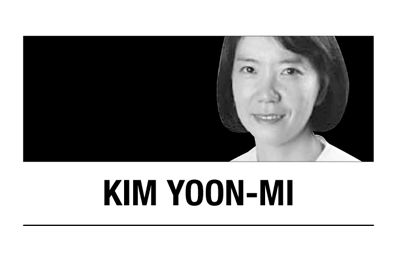 Whenever Chuseok, or the Korean thanksgiving, comes around, I ponder how my father helped me witness the true meaning of the holiday during my teenage years.
Whenever Chuseok, or the Korean thanksgiving, comes around, I ponder how my father helped me witness the true meaning of the holiday during my teenage years.
Born and raised in Seoul, Chuseok was the most painful time of year for me. Traveling to Buan, North Jeolla Province, meant going through the crazy traffic incurred by the massive exodus of Seoulites visiting their parents’ homes in rural areas.
The more challenging part was that I had to spend several days at my grandma’s place doing “nothing,” and scores of relatives — who barely knew me other than that I was the first daughter of the second son of my grandparents — asked rude questions such as where I ranked in school and which university I aimed to enter.
Another issue they would raise was my short hair. My hair was neither Audrey Hepburn-styled feminine cut nor Princess Diana’s graceful one. Mine was rather an Asian middle-school boy haircut, inspired by K-pop legend Seo Taiji who was a rebellious youth icon in the 1990s.
Not seeing who had inspired my hair cut, my senior relatives would make blunt comments such as “Why don’t you grow your hair to look more girlish.” They would almost click their tongues in disapproval seeing me in baggy pants and with ear piercings.
However, my father was wise enough to avoid family conflicts. He would crack jokes with my relatives, saying, “You know what, I can spot my daughter in her (girls’) high school from 100 meters away because of her hair style.”
Then, he would enjoy eating tons of “songpyeon,” or rice cakes, and “jeon,” a pancake-like Korean dish, after paying respect to his ancestors with his brothers and their sons.
On hindsight, he exactly followed the true spirit of Chuseok — having gratitude and tolerance for a big family gathering. I lacked these values at the time and failed to see my relatives’ intentions to get to know me better. My relatives also lacked them and failed to thank me for making an arduous trip from Seoul.
Chuseok, also known as hangawi, is supposed to be the best time of the year. As the Korean saying goes, “No more, no less, may it always be like hangawi.” Families celebrate the year’s harvest and thank one another and their ancestors. Although Korean families have become much smaller due to urbanization, many still follow the tradition of gathering for ancestral rites.
However, the essence of the nation’s largest traditional holiday is often overshadowed. Gratitude and tolerance are often hard to find. Consequently, a majority of news reports about Chuseok are negative ones, pushing people further from gratitude and tolerance.
People lament that the prices of newly harvested fruits have risen so high that memorial rites for ancestors cost too much. But they rarely give thanks to the magic of nature that has produced abundant crops through stormy winds and scorching heat.
People are more interested in which gifts they should buy rather than deeply looking back on how much their family and friends mean to them.
Lacking tolerance, estranged married couples get extremely emotional with each other during Chuseok. The divorce rate is 10-20 percent higher immediately after the holiday in September, according to news reports.
However, if we choose to, we may turn a stressful time into a joyful and happy one by focusing on the true spirit of Chuseok — being grateful for what we have and being tolerant of the facts of life.
Instead of complaining why we have to spend so much money on gifts, allowances for the elderly, as well as pocket money for nieces and nephews during Chuseok, we can be grateful for having such a big family, a great asset in life.
If we are stuck for long hours in the heavy traffic on highways, we can take it as a great chance to play road games such as word chain, hangman or bingo with kids who would be otherwise glued to smartphones and get car sick.
I must confess that I am still miserably poor at giving thanks and still intolerant. But I will strive to remember my father’s wisdom during the upcoming Chuseok holiday when I join my husband’s big family gathering.
I hope to thank in-law relatives for their attention toward my family if they ask whether I plan to have a second child, rather than taking it as an offense. And for all the years to come, I hope to pass my father’s wisdom on to my 3-year-old son, who might turn out to be even more rebellious than me in the future when he becomes a teenager.
By Kim Yoon-mi
Kim Yoon-mi is the digital content desk editor of The Korea Herald. She can be reached at yoonmi@heraldcorp.com. — Ed.
- Heavy rains set off flash floods in northern Afghanistan, killing at least 47 people
- Tycoon Musk launches Starlink in Indonesia
- CJ Logistics to build cold chain logistics center in central US
- Choi Kyoung-ju becomes oldest winner on S. Korean golf tour on 54th birthday
- Seoul halts plan for cross-border shopping limits
- [AtoZ into Korean mind] World of the in-laws, where gender stereotypes persist
- Actors involved in past controversies return first via streaming service originals
- Explore different Annlees, 'Make a Wish' at Buk-Seoul Museum of Art
- Pupils to gather in Seoul, Tokyo to celebrate Janos Starker's 100th birthday in July
- Korean builders nervous about possible setbacks in Middle East


![[Weekender] Geeks have never been so chic in Korea](http://res.heraldm.com/phpwas/restmb_idxmake.php?idx=644&simg=/content/image/2024/05/16/20240516050845_0.jpg&u=)


![[News Focus] Mystery deepens after hundreds of cat deaths in S. Korea](http://res.heraldm.com/phpwas/restmb_idxmake.php?idx=644&simg=/content/image/2024/05/17/20240517050800_0.jpg&u=)

![[Herald Interview] Byun Yo-han's 'unlikable' character is result of calculated acting](http://res.heraldm.com/phpwas/restmb_idxmake.php?idx=644&simg=/content/image/2024/05/16/20240516050855_0.jpg&u=)

![[Photo News] Seoul seeks 'best sleeper'](http://res.heraldm.com/phpwas/restmb_idxmake.php?idx=644&simg=/content/image/2024/05/18/20240518050098_0.jpg&u=)








